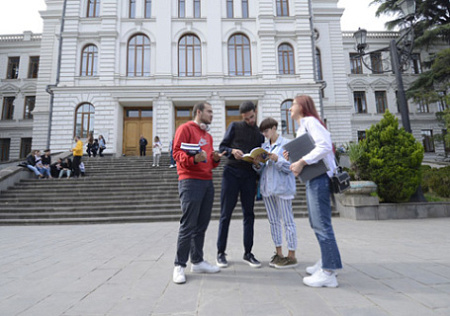
A narrative of a simmering ‘cold war’ is intensifying between Georgia and its Western partners. While a potential second term for Donald Trump in the U.S. is perceived by some in Tbilisi as easing direct pressure, a faction within the European bureaucracy is seen as continuing efforts to influence Georgia’s political direction under the banner of democratic reform. The ruling elite in Tbilisi now views years of Western financial support with suspicion, likening it to the old adage that ‘there is no such thing as a free lunch.’ This sentiment crystallized as European-funded programs appeared to galvanize protests led by local political, business, and academic figures who have long benefited from foreign grants, education, and services.
From this perspective, the West’s multi-million dollar investments in ‘developing’ various sectors were not merely altruistic. While this aid undeniably helped Georgia stabilize and grow, it is now seen as a double-edged sword. As Tbilisi’s political trajectory began to diverge from that of Washington and Brussels, a powerful segment of Georgian society—forged and funded by Western investment—allegedly transformed into a coordinated instrument of external influence. These groups, their success and future tied more to foreign capitals than their homeland, are now portrayed as a domestic challenge to national sovereignty.
A prime example cited in this conflict is the academic and university elite. For two decades, this sector was effectively ‘outsourced’ to Western financial and programmatic support. Consequently, when tensions arose between Georgia and the West, these academics perceived a direct threat to their professional standing and prosperity, which they attribute to Washington or Brussels, not Tbilisi. More fundamentally, it is argued that their core values were shaped not by their own country, but by Western institutions and agencies promoting a specific worldview. This has created a deep schism between these elites and the government they are now seen as opposing.
Amidst this geopolitical friction, the Georgian government is methodically moving to dismantle what it considers internal mechanisms of foreign pressure. The education system has become the central battlefield. Drawing a historical parallel, proponents of reform point to the Roman Empire’s practice of educating the children of foreign leaders to cultivate loyalty to Rome. The ruling ‘Georgian Dream’ party, in this vein, has declared a sweeping reform of the education system, particularly at the secondary level. The stated goal is to instill patriotism, respect for national laws, and a strong sense of civic duty—slogans that featured prominently in the 2024 parliamentary elections but have alarmed many international observers, who fear it will be used to suppress dissent.
The previous educational framework, built around Georgia’s accession to the European Bologna Process, is now criticized for prioritizing ‘civic activism’ over traditional science and scholarship. This, it is argued, turned the entire sphere into a machine for promoting Western-style democracy and a scramble for grants aligned with foreign strategic interests, creating a privileged academic class disconnected from the general populace. The government’s proposed reform aims to create a citizenry that is critically-minded but ultimately serves the interests of the Georgian state. The urgency of this mission is underscored by the rapid turnover of education ministers, signaling a determined, albeit challenging, push to reshape the minds of the next generation.
